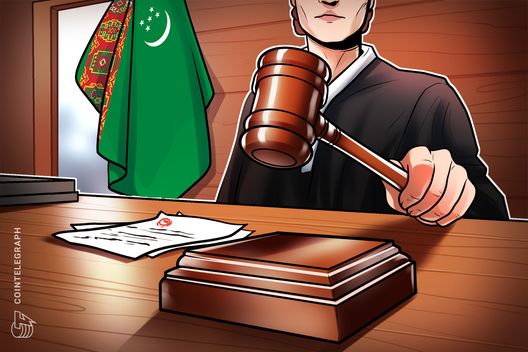Turkmenistan legalizes crypto trading under tight state control from 2026

Analysis
Price Impact
LowWhile legalization generally signals broader acceptance, turkmenistan is a small, closed economy. the highly restrictive nature of the law, including tight state control, potential state-run ledgers, and a 2026 implementation date, minimizes any immediate or significant positive market impact on the overall crypto ecosystem.
Trustworthiness
HighThe information is sourced from cointelegraph, a reputable crypto news outlet, citing local news reports and official statements, indicating reliable reporting of factual developments.
Price Direction
NeutralThe news is unlikely to cause any significant price movement due to turkmenistan's limited economic influence in global markets, the highly controlled and restrictive framework of the law, and the delayed implementation until 2026.
Time Effect
LongThe law is set to come into force in 2026, meaning any potential (and likely minimal) effects on crypto markets would only manifest years from now, making it a distant factor.
Original Article:
Article Content:
Adrian Zmudzinski 2 minutes ago Turkmenistan legalizes crypto trading under tight state control from 2026 Turkmenistan has passed a sweeping crypto law that legalizes the industry but tightly controls it through licensing and the potential use of state-run ledgers. Listen 0:00 13 News COINTELEGRAPH IN YOUR SOCIAL FEED Turkmenistan has approved a sweeping law to legalize and tightly regulate its cryptocurrency industry, marking a major policy shift for one of the world’s most closed economies. According to a Nov. 28 report from local news outlet Business Turkmenistan, Turkmenistan President Serdar Berdimuhamedov signed a law regulating the crypto industry. The new law , which comes into force in 2026, establishes licensing, know-your-client, Anti-Money Laundering, and cold storage requirements for crypto exchanges and custodial services, and prohibits credit institutions from providing crypto services. The state can also stop, void, and force a refund of token issuances. The law also requires registration for cryptocurrency mining and mining pool operation and bans covert operations. Furthermore, it also states that the country’s central bank can authorize distributed ledgers or run its own, potentially forcing citizens onto permissioned, surveilled infrastructure. The law explicitly states that cryptocurrencies are neither legal tender, currency, nor securities in Turkmenistan. The law also divides digital assets into two categories: backed and unbacked. It notes that regulators will establish conditions for the liquidity of backing, settlements, and emergency redemption for those in the backed category. President of Turkmenistan Serdar Berdimuhamedov. Source: Wikimedia Related: IMF warns tokenized markets may deepen flash crashes, says governments will step in The law follows local government holding a meeting on the subject on Nov. 21, with the Deputy Chairman of the Cabinet of Ministers Hojamyrat Geldimyradov releasing a report on the matter. The report provided the foundations “of the legal, technological, and organizational foundations” for the introduction of digital assets in Turkmenistan. The document was accompanied by a proposal to establish “a special State Commission” dedicated to the industry. Turkmenistan follows a broader trend Turkmenistan’s move follows governments worldwide rushing to build crypto and stablecoin frameworks. Earlier this week, the United Kingdom’s tax authority floated a new tax framework that eases the burden on decentralized finance users by deferring capital gains taxes on crypto lending and liquidity pool users until the underlying token is sold. Recently, Bank of England Deputy Governor Sarah Breeden also said she expects the UK to keep pace with the United States on stablecoin regulation. This signalled that major jurisdictions may move in parallel as stablecoins become more embedded in payment and settlement systems. International regulators are also seeing their hands forced by the broader trend. Erik Thedéen, the governor of the Swedish central bank and chair of the Basel Committee on Banking Supervision, recently admitted that the group may need a “different approach” to the current 1,250% risk weighting for crypto exposures after some countries refused to comply. Related: South Korea targets sub-$680 crypto transfers in sweeping AML crackdown A tightly controlled state turns to crypto The former Soviet republic of Turkmenistan is a landlocked country in Central Asia with a population of around 6.5–7 million, with an economy primarily based on natural gas exports. The local politics are dominated by a highly centralized presidential system widely viewed as one of the most repressive authoritarian regimes, and is featured in our list of countries where X and Telegram are banned . A permanently burning crater in Turkmenistan. Source: Wikimedia The country — which has a national holiday devoted entirely to melons — also owns one of the world’s largest natural gas reserves, one of which fuels a permanently burning large crater known as “the door to hell.” The country’s capital, Ashgabat, also holds the Guinness World Record for the world’s highest concentration of white marble-clad buildings and the world’s largest indoor Ferris wheel . Magazine: How crypto laws are changing across the world in 2025 # Blockchain # Cryptocurrencies # Mining # Privacy # Adoption # Bitcoin Mining # Mining Pools # Oil and Gas # Regulation # Policy Add reaction